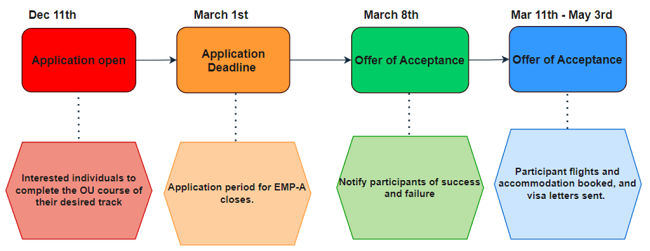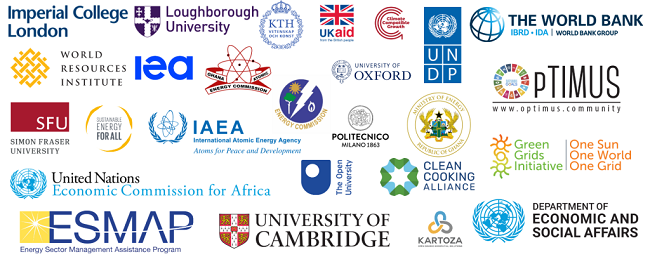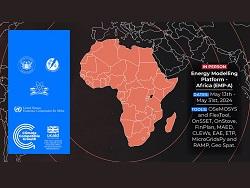This is the fifth round of the Energy Modelling Platform for Africa (EMP-A), which started in 2018 and aims to transfer skills in models and tools for energy planning needs.
There is no fee to attend; however, competition for space is high, and space is limited. Funding is also available for flights and accommodation.
Although EMP-A acknowledges that different countries and regions within Africa will require context-specific approaches, the overarching objectives of the platform are to:
- Gather the energy planning and modelling community in Africa to share experiences, models, and data in climate, land, energy, and water systems.
- Support human and institutional capacity in Africa for integrated energy modelling and investment planning.
- Support the development of centres of excellence for energy planning in Africa.
- Promote efficient and widespread use of open-source modelling tools to support the implementation of the SDGs, the Paris Agreement, and Africa’s Agenda 2063.
EMP-A 2024 will take place from 13 May to 31 May 2024 and is an in-person event (the first week is online only), taking place at the Ghana Institute of Management and Public Administration).
The full concept note is available for download here
There are now nine courses available as part of EMP-A. See below for details.
How to Apply
As part of the application, you will need to complete the Open University course for the tool you wish to be trained in.
For example: if you would like to apply for OSeMOSYS and FlexTool, you would need to complete the course on the Open University website for OSeMOSYS and FlexTool.
Once completed, you will receive a certificate from the Open University. The certificate must be attached to your application form.
All the courses are available free via the Open University (OU) [Links open in a new tab].
- OnSSET / Global Electrification Platform
- Energy and Flexibility Modelling: OSeMOSYS & IRENA FlexTool (Windows and Mac OS)
- MAED (Model for Analysis of Energy Demand)
- Introduction to CLEWS: Climate, Land-Use, Energy and Water Systems
- Electricity Transition Playbook
- OnStove (Geospatial clean cooking analysis model)
- Energy Access Explorer
- Geospatial data, best practices for collection and management
- Microgridspy and RAMP
Please watch the following video [opens in new tab] to understand how to complete the Open University course.
For full application details, please see section below.
Application Period:
11 December 2023 to 1 March 2024

- 11 Dec 2023 – Applications open. Interested individuals should start the OU course to complete it before the application deadline
- 1 March 2024 – Application deadline at 12pm Central African Time.
- 8 March 2024 – Participants a notified of whether their application was successful or not
- 11 March to 3 May 2024 – Participant flights and accommodation are booked and visa letters are sent.
When you complete your application, you must attach the following:
- A certificate of completion for the respective Open University course (with the exception of the MicroGridsPY and RAMP course)
- A certificate of completion for ‘Modelling, policy and political economy‘, a free Open University course. [all applicants]
- A stamped Letter of Commitment, which stipulates an express statement from participants’ respective institutions towards attendance fo the module of choice. This letter must demonstrate that the output of your study is in demand by government/is policy-relevant research or that the skills you acquire will be used in university teaching/government planning. [All applicants]
- A Letter of Motivation in which the applicant states why they should be selected for the course, and why their background knowledge and experience makes them ideal for the course.
Training Period

- Induction Session, 8 May, online Information about how the event should be approached and the importance of modelling and its applications.
- Week 1 of training, 13–17 May, online, Online training and initial modelling begins
- Week 2 of training, 20–24 May, in-person, In-person training begins
- Week 3 of training, 27–30 May, in-person, In-person training continues and participants will present their work on 30 May
- High-Level Meeting and Roundtable Meeting, 31 May, in-person, Participants invited to attend high-level meetings at the end of EMP-A
Application
Please follow the link to apply: https://loughboro.qualtrics.com/jfe/form/SV_bP0hanHRWitS2ea [opens in new tab]
Please note, you will need to submit all the required documents for your application to be successful. Applicants will need to have stable internet access to participate in training, and a relatively new computer (with at least 8 GB of RAM). Some courses have additional requirements (see full concept note)
If you have any questions about any part of the EMP-A please get in touch with OpTIMUS Inquiries.
Partners

In alphabetical order:
- African Climate Policy Centre – United Nations Economic Commission for Africa (ACPC-UNECA)
- Climate Compatible Growth Programme (#CCG)
- Energy Sector Management Assistance Program (ESMAP)
- Green Grid Initiative (GGI)
- Ghana Atomic Energy Commission (GAEC)
- Ghana Energy Commission
- International Atomic Energy Agency (IAEA)
- International Renewable Energy Agency (IRENA)
- Imperial College London (ICL)
- Kartoza
- KTH Royal Institute of Technology (KTH)
- OpTIMUS Community of Practice
- Politechnico Di Milano
- Republic of Ghana Ministry of Energy
- Simon Fraser University
- Sustainable Energy for All (SEforALL)
- The Loughborough Centre for Sustainable Transitions: Energy, Environment, and Resilience (STEER)
- United Kingdom Foreign, Commonwealth and Development Office (UK FCDO)
- United Nations Department of Economic and Social Affairs (UNDESA)
- United Nations Development Programme (UNDP)
- University of Cambridge
- University of Oxford
- World Resource Institute
- World Resource Institute (WRI)
- World Bank Group (WBG)
